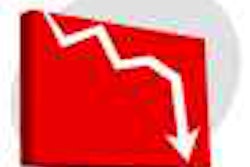
The current economic downturn is keeping many patients out of the dental chair. But it's not just a matter of money, a new study suggests; rather, it's fear and stress.
The study, published online last month by Health Services Research (September 12, 2008), found that the correlation between a struggling economy, rising unemployment, and a drop in preventive dental care is not necessarily due to people being out of work or short of cash.
— Brian Quinn
Rather, the distraction of worrying about not having a job could make nonemergency dental care drop off a person's radar -- even those with health insurance, according to Brian Quinn, program officer for the Robert Wood Johnson Foundation and lead author of the study.
"During stressful periods, those things that don't seem as urgent may be ignored," Quinn said. "This is stress about the economy overall. People are concerned about themselves or their partners losing their jobs, so decisions about going to the dentist go by the wayside."
The psychological effects of the current economic downturn are impacting many U.S. dental practices, Roger Levin, D.D.S., president of Levin Group, a dental practice management company, said in an interview with DrBicuspid.com.
"We are definitely seeing a lot of practices slowing down, and we definitely believe this is due more to fear -- economic fears tied to a slowdown in spending -- than reality," Dr. Levin said. In the upcoming Annual Practice Survey that the Levin Group does with Dental Economics each November, "our data shows that practices are very flat compared to a year ago," he added.
In the HSR study, Quinn and his colleagues analyzed 10 years of information (1995-2004) from Washington Dental Services, the largest dental insurer in the state, about visits to dentists' offices in Seattle and Spokane. They compared this information to unemployment data from the Bureau of Labor Statistics and Washington's Employment Security Department.
They found that, in the Seattle area, for every 10,000 people who lost their jobs there was a 1.2% decrease in visits to dentists for checkups -- not just among the unemployed. The drop was higher in the Spokane area, where the same increase in unemployment was associated with a 5.95% decrease in preventive visits.
"During stressful periods, the distraction mechanism predicts that the resources needed to cope with life's challenges leave too little time or energy for nonurgent activities," the study authors wrote. "Thus, routine checkups that are received normally would be postponed or foregone altogether during periods of high unemployment. The distraction mechanism can be particularly acute for utilization of preventive care because of its seemingly discretionary nature."
Quinn emphasizes that the study only included people who had dental insurance -- not those without insurance or on COBRA, Medicaid, or other subsidized healthcare.
"This was a population that had dental insurance and preventive coverage," he said. "So it was not a reduction in spending but inaction. They just were not going to the dentist for preventive care."
He noted that one of the study co-authors, Ralph Catalano, has done similar research on the psychological effects of an economic downturn on the utilization of other preventive care measures, such as mammograms (American Journal of Public Health, April 1, 1998, Vol. 88:4, pp. 586-589). Catalano found that during economic downturns, the stage of breast cancer diagnosis was later because women had been delaying or foregoing mammograms, Quinn said.
This phenomenon poses a challenge for dentists today, in terms of both patient and practice management.
"The current economic downturn is changing the way dentists are interacting with and approaching their patients," Dr. Levin noted. But the well-prepared dentist can maneuver an economic downturn and keep their patients coming back, he added. His company teaches a 71-step "New Patient Experience" that emphasizes a more personalized approach to developing patient relations, such as taking the time to learn 10 personal things about a patient before you touch their teeth, Dr. Levin said. The goal is to help them overcome the "distraction mechanism" cited in the HSR study by easing their anxiety and increasing their confidence in the treatments you recommend.
"You want to retain as many patients as you can today," Dr. Levin said. "You don't want to lose them."
In addition to learning new ways of communicating with patients, dentists should consider adopting a more flexible approach to practice management in tough economic times, the HSR study authors recommended.
"An appreciation for the effects that economic downturns have on utilization is important for dentists wanting to maintain financially successful practices.... They may wish to adjust staffing patterns, prices, or operating expenses," they wrote. "Dental care providers should be prepared to face future increases in demand for restorative and emergency services that result from decreased demand for preventive care today."
If you've got fewer patients coming in the door, use the extra time to figure out how you can run a tighter ship, Dr. Levin advised. This will both cut your costs and improve the patient's experience, building loyalty.
"Dentistry is so resilient, but this is probably the worst economy we've had in 40 years," Dr. Levin said. "So it is very important for practices today to have the best step-by-step systems in place they've ever had, from case presentation and scheduling to hygiene productivity and patient financing. You don't have to sit around and wait for the economy to improve. The key is to be proactive."


















